The Establishment in New Zealand is becoming deeply unpopular. A range of new survey data shows that public discontent with politicians, the media, business and NGOs continues to grow.
At every New Zealand general election, a group of academics survey the public about their attitudes toward politicians. The results for last year’s 2023 New Zealand Election Study (NZES) were presented last week at Victoria University of Wellington by political scientist Mona Krewel at a symposium with Ashley Bloomfield, looking at “Trust in Institutions and Democracy in Aotearoa New Zealand”. The survey’s data reveals an increasing decline in public trust and respect for politicians and some concerning judgments about the integrity of the political process.
In 2023, the NZES survey asked a new question to get a sense of the extent to which New Zealanders think the political system is biased in favour of elites. People were asked whether they agreed with the statement: “Most politicians care only about the interests of the rich and powerful”. About 35% agreed with this, and about 37% disagreed. So, this suggests that about a third of the population believes that the “rich and powerful” dominate the political system, i.e. democracy isn’t working.
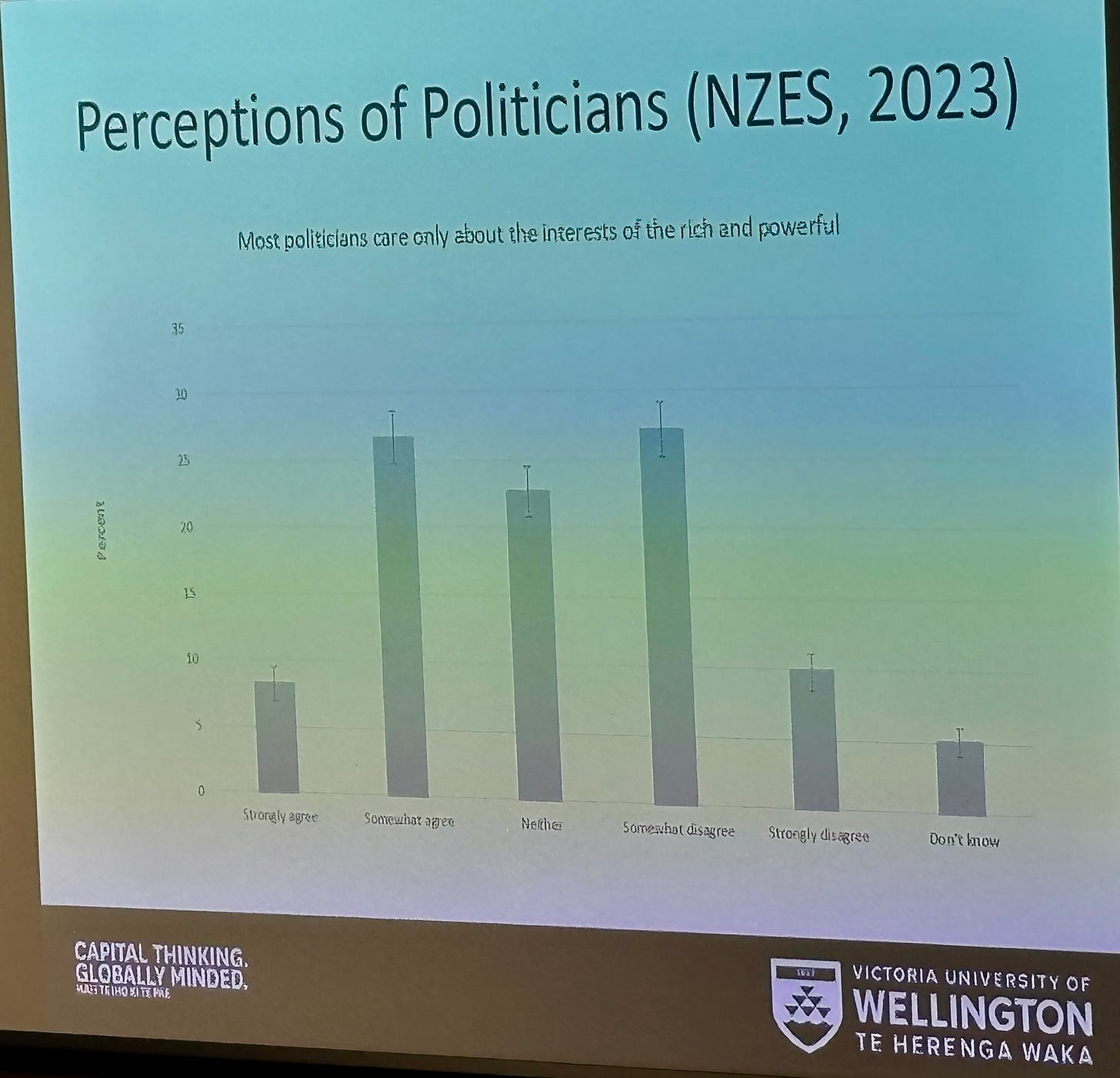
Click image to View - Slide from Mona Krewel’s presentation of NZES data on whether the rich and powerful dominate politics
Similarly, respondents were asked whether they agreed with the statement: “Most politicians act in the best interests of all”. Again, over a third are discontented with democracy – about 36% disagreed that politicians act in favour of everyone’s interests. And only 29% agreed with the statement.
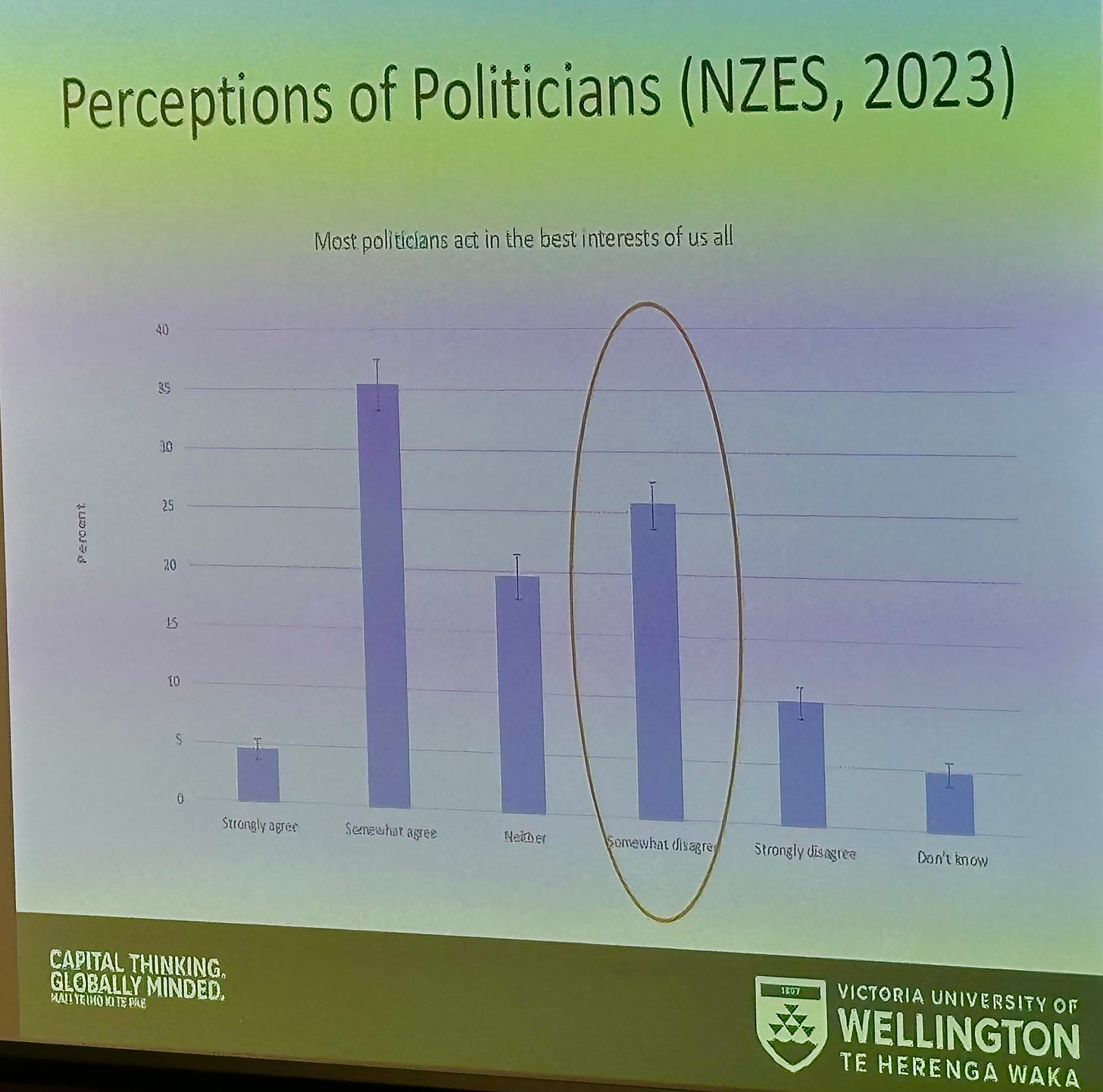
Click image to view - Slide from Mona Krewel’s presentation of NZES data on whether politicians act in the best interests of all
There have been a lot of scandals in recent years related to the integrity of parliamentarians. Therefore, it’s helpful that the NZES asked respondents: “How would you rate the standards of honesty and integrity of elected politicians in New Zealand today?”. On this, 31% rated NZ MPs as having “low” honesty and integrity, and only 27% rated the standards as “high”.
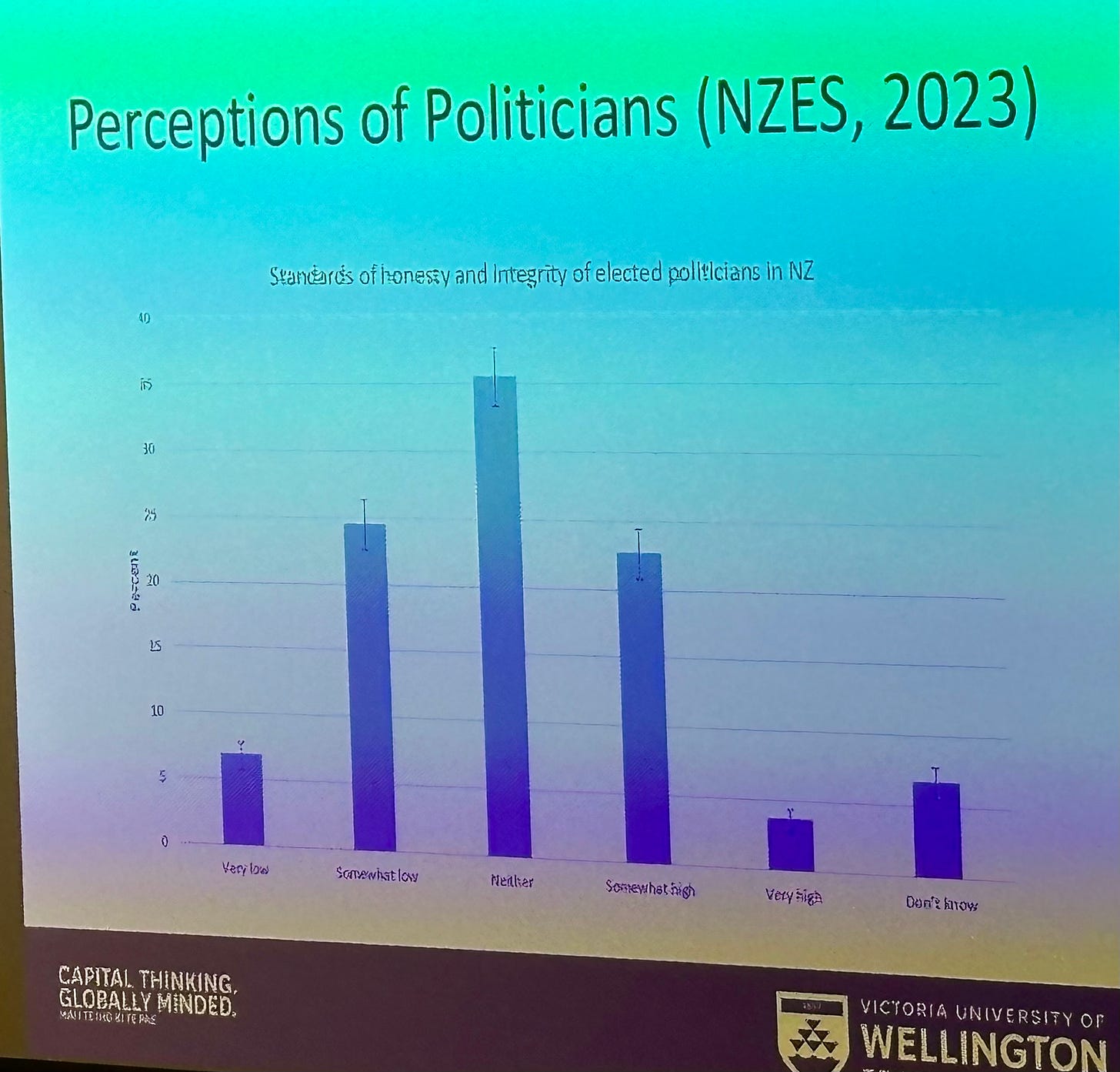
Click image to view - Slide from Mona Krewel’s presentation of NZES data on MP standards and integrity
Similarly, respondents were asked whether they agreed with the statement: “Most politicians behave with great integrity”. About 42% agreed, and 36% disagreed.
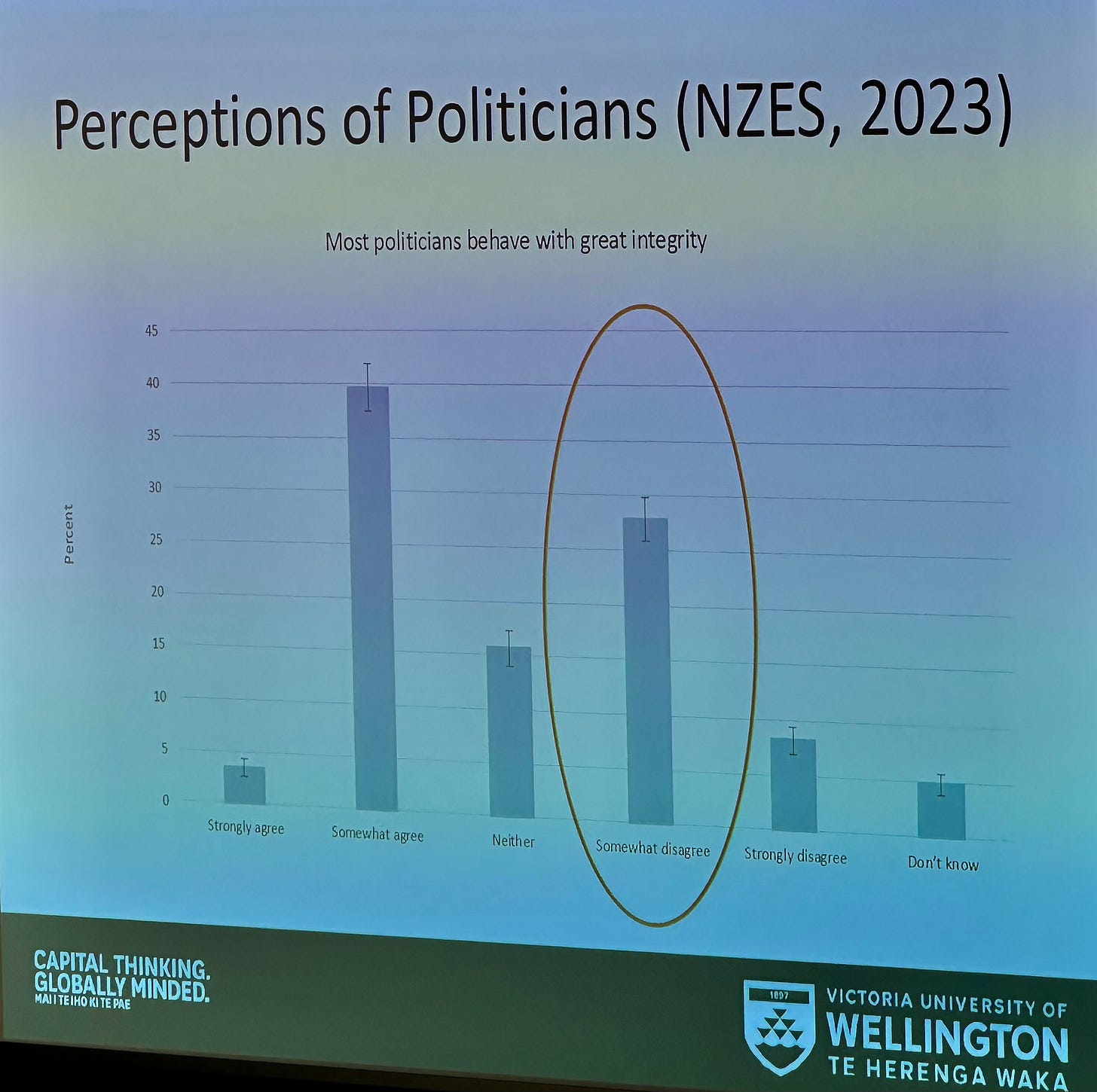
Click image to view - Slide from Mona Krewel’s presentation of NZES data on whether politicians behave with integrity
The public’s trust in politicians appears to be declining, according to the NZES data. At each election, the survey asks to what extend respondents believe that “Most politicians are trustworthy”. Rated on a 1-5 scale where 5 means very trustworthy, in 2023 the average rating was only about 2.87/5. This rating has been dropping since 2017.
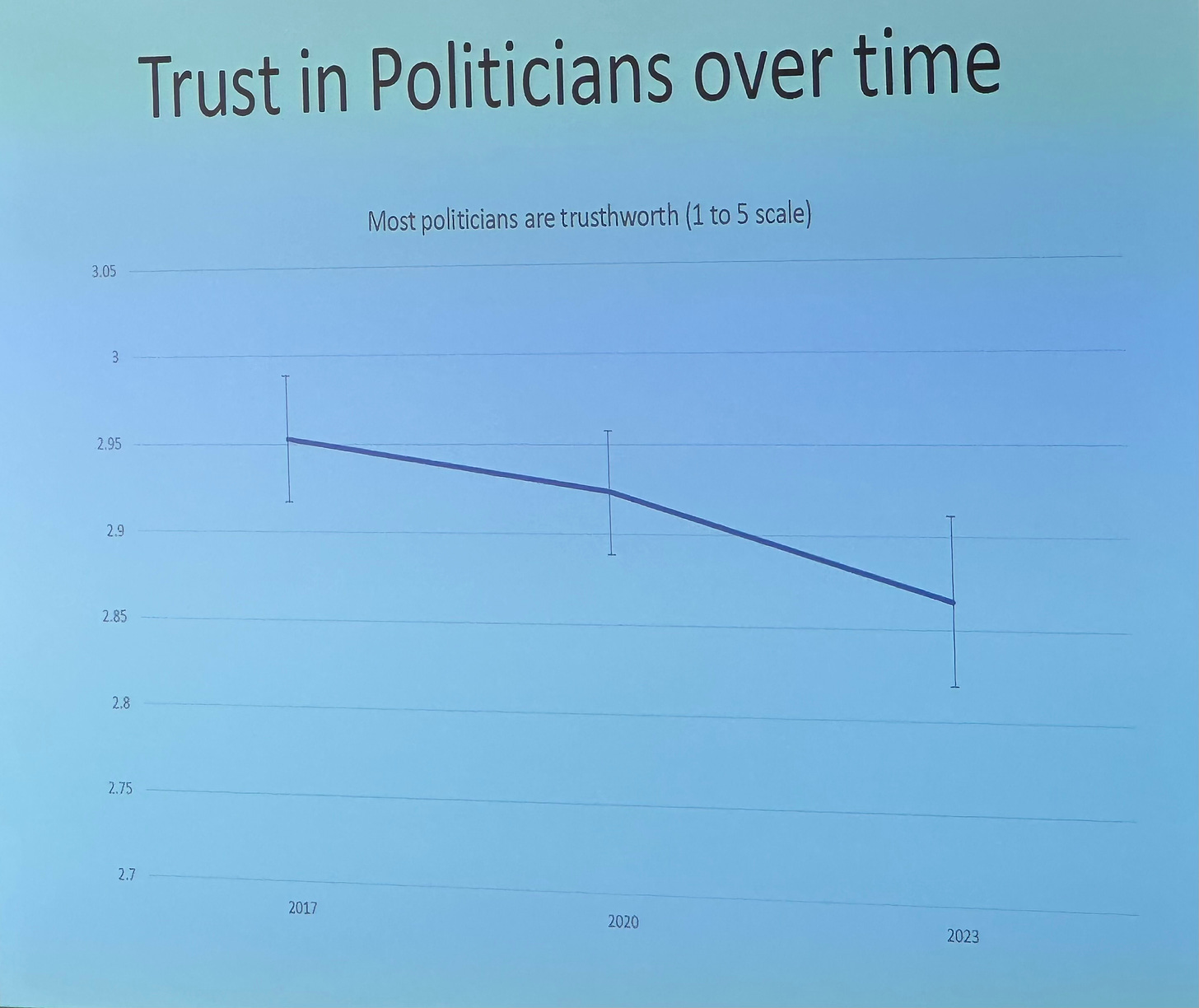
Click image to view - Slide from Mona Krewel’s presentation of NZES data on trust in politicians over time
Commenting on these polling trends, Jacqui Van Der Kaay wrote an analysis column yesterday for the Democracy Project, arguing that “Politicians need to lift their game”. She has also written a chapter about the impact of integrity issues on the 2023 election, which is coming out in the forthcoming book, “Back on Track?” about the election campaign.
Van Der Kaay argues that although integrity issues dominated the election campaign last year, things appear to have worsened this year. She explores some of the ways more must be done to clamp down on integrity violations.
Trust in Politics and Media plummets in the latest Acumen Edelman Trust Barometer
Each year the Edelman PR company publishes a global survey about public trust in authorities. The New Zealand element of this survey is commissioned by local PR firm Acumen, and the results haven’t yet been formally published anywhere. However, the results are also reveal declining public trust, and therefore they deserve a wider audience.
This year, the trust results for the institutions of Government and the Media are particularly negative. In line with other survey results, it reveals that New Zealanders are quickly losing faith in politics and journalism.
The Acumen-Edelman survey asked respondents to indicate whether they trust the institution of Government to do what is right, and 48% said they did. This was down three percentage points on the results for 2023. And it compares to the global results of 51%.
The institution of the Media fares much worse. Only 36% trust the media to do what is right, and this has dropped five percentage points in just one year. And New Zealand’s results compare very unfavourable to the global results of 50% satisfaction for the media.
NGOs in New Zealand are more trusted – with 57% indicating trust. And the institution of Business does the best – with 60% trusting them (but lower than the global average of 63%).
According to the Edelman categorisation of trusted institutions, this means that Media (36%) and Government (48%) are “Distrusted” institutions in this country, NGOs fall into the “Neutral” category, and Business is the only “Trusted” institution.
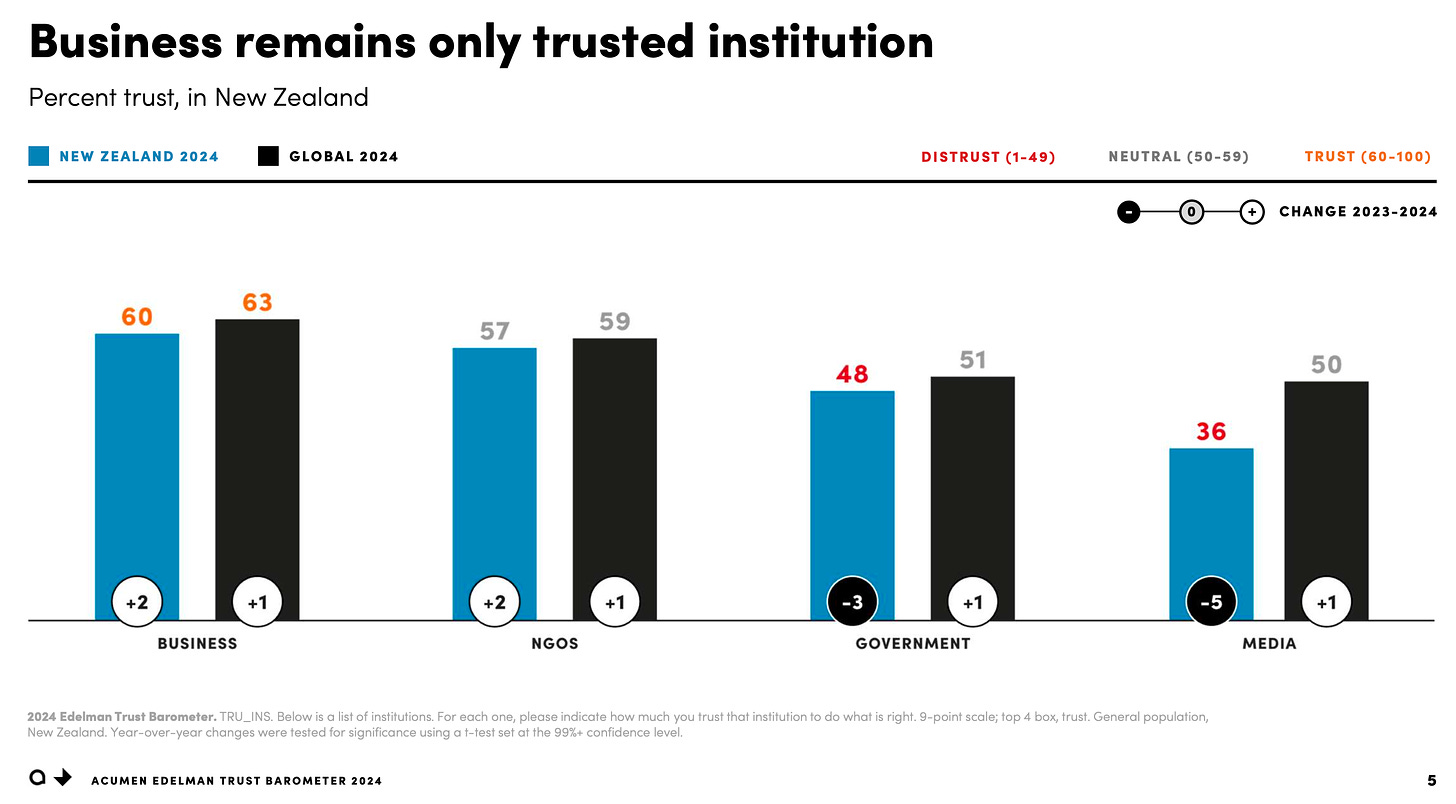
Click image to view - From the Acumen Edelman Trust Barometer 2024: Levels of trust in Business, Government, NGOs and Media
The general public trust in these institutions has been fluctuated over time. And it’s worth noting that institutions like Government and the Media initially became more trusted after 2017, but have declined considerably over the last two years. Trust in Government has dropped nine percentage points from a height of 57% at the time of the 2022 Acumen Edelman Trust Barometer.
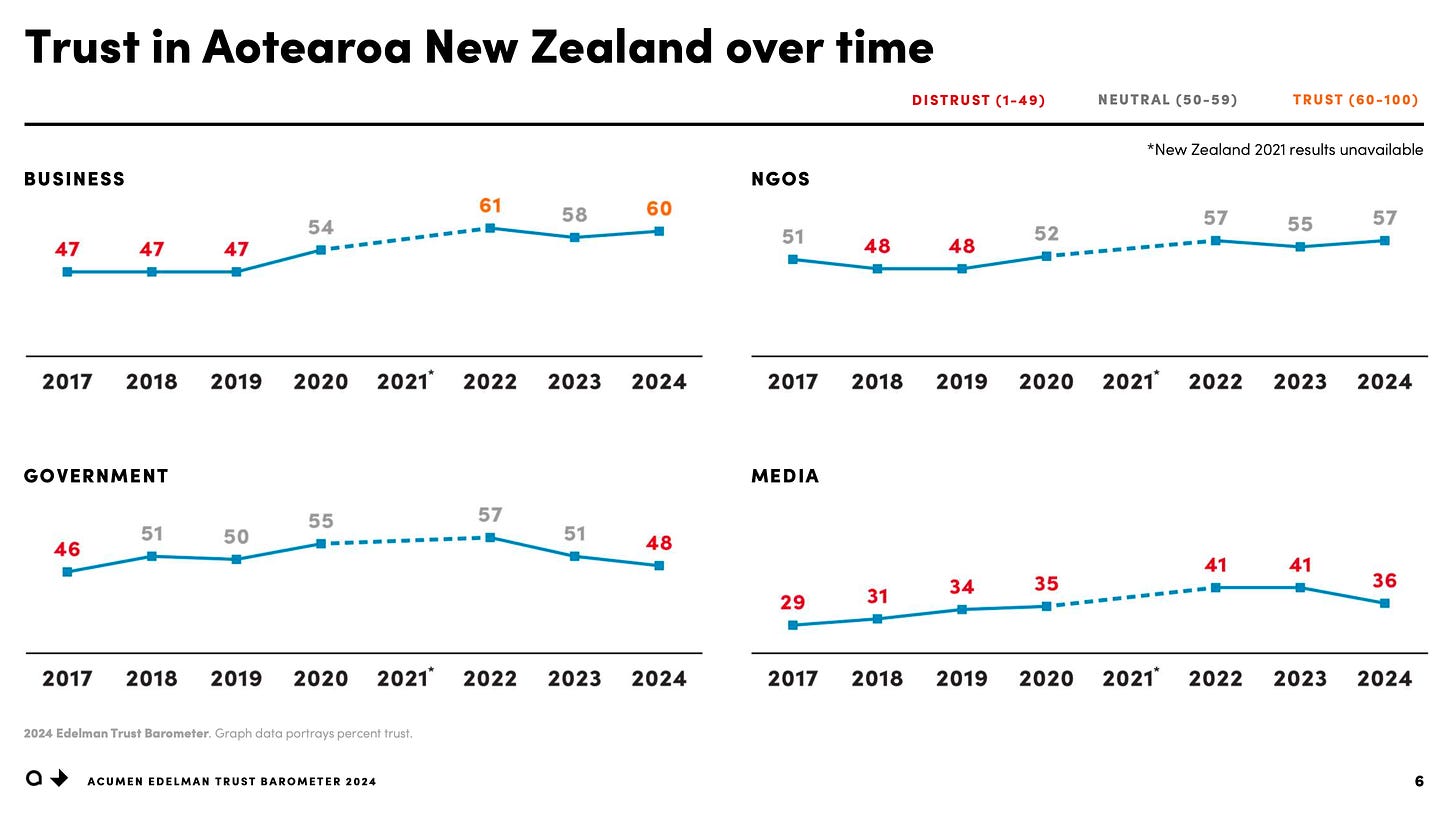
Click image to view - From the Acumen Edelman Trust Barometer 2024: Levels of trust since 2017
Survey respondents were also asked about their evaluations of the ethics and competency of the four main institutions. Again, Media and Government fared particularly poorly in the latest Trust Barometer. In terms of ethics, Government has gone from a +15 in the 2022 report to a -7 this year. Media has gone from -8 to -16 in this period. Meanwhile, NGOs and Business have only declined a small amount.
When it comes to an evaluation of competency, Government has gone from -15 to -26, and Media from -25 to -34. Meanwhile, NGOs and Business have seen increases in perceived competence.
The difference is public perception about the competency and ethics of Government and Business is troubling. In terms of ethics, the public gives Business a score that is 18 points higher than Government. For competency, the gulf is even more significant – 46 points higher.
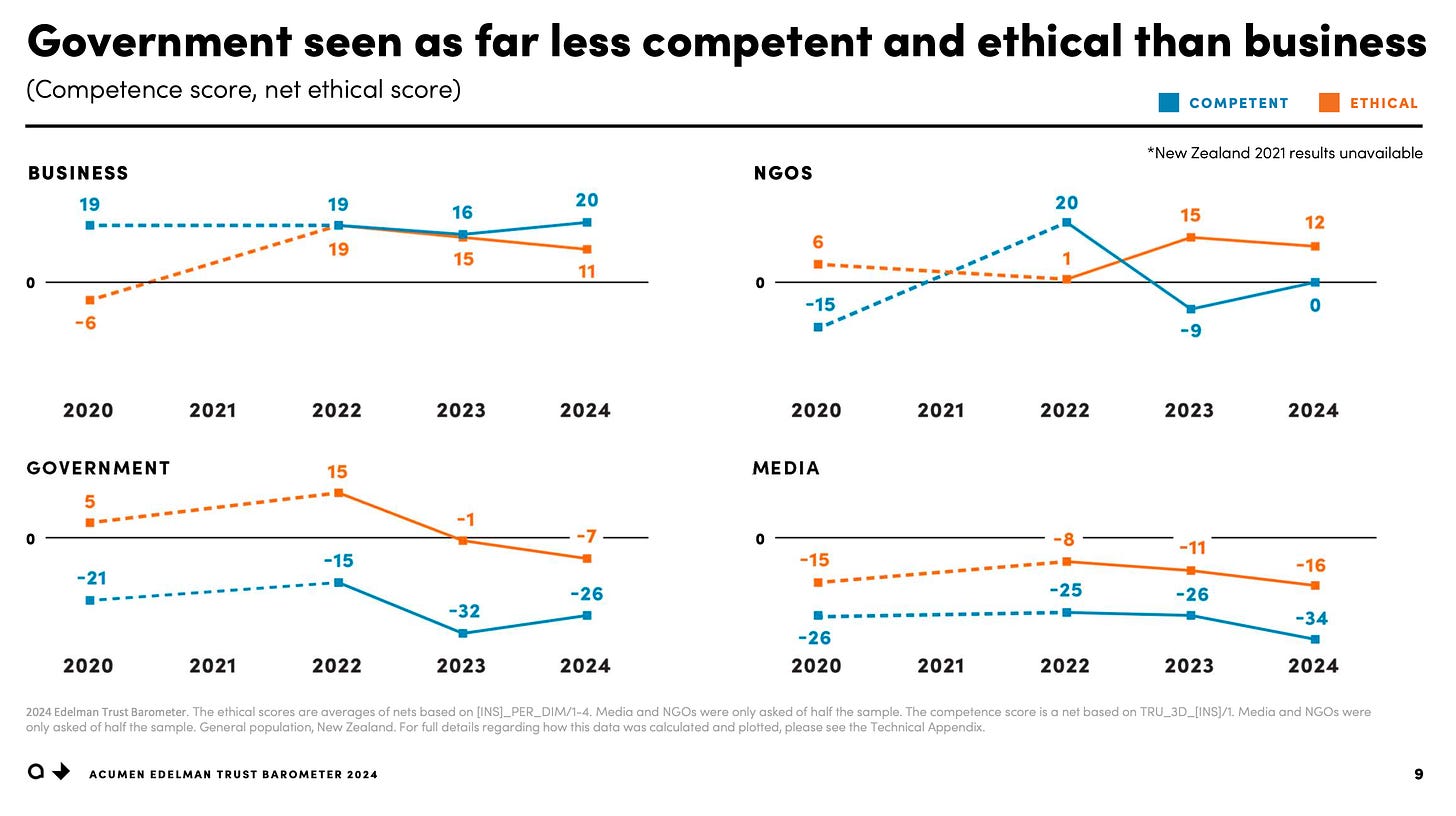
Click image to view - From the Acumen Edelman Trust Barometer 2024: Evaluation of ethics and competency over time
The public’s trust in various professions is also tested in the Edelman survey. The profession of Teachers comes out on top – 77% have confidence in them. At the bottom of the rankings are Journalists – trusted by 36% of New Zealanders. This score has dropped two percentage points since last year, and it compares to a global average of 49%. Trust in the profession of “Government leaders” is also low, at 40%. This figure has dropped five percentage points in a year.
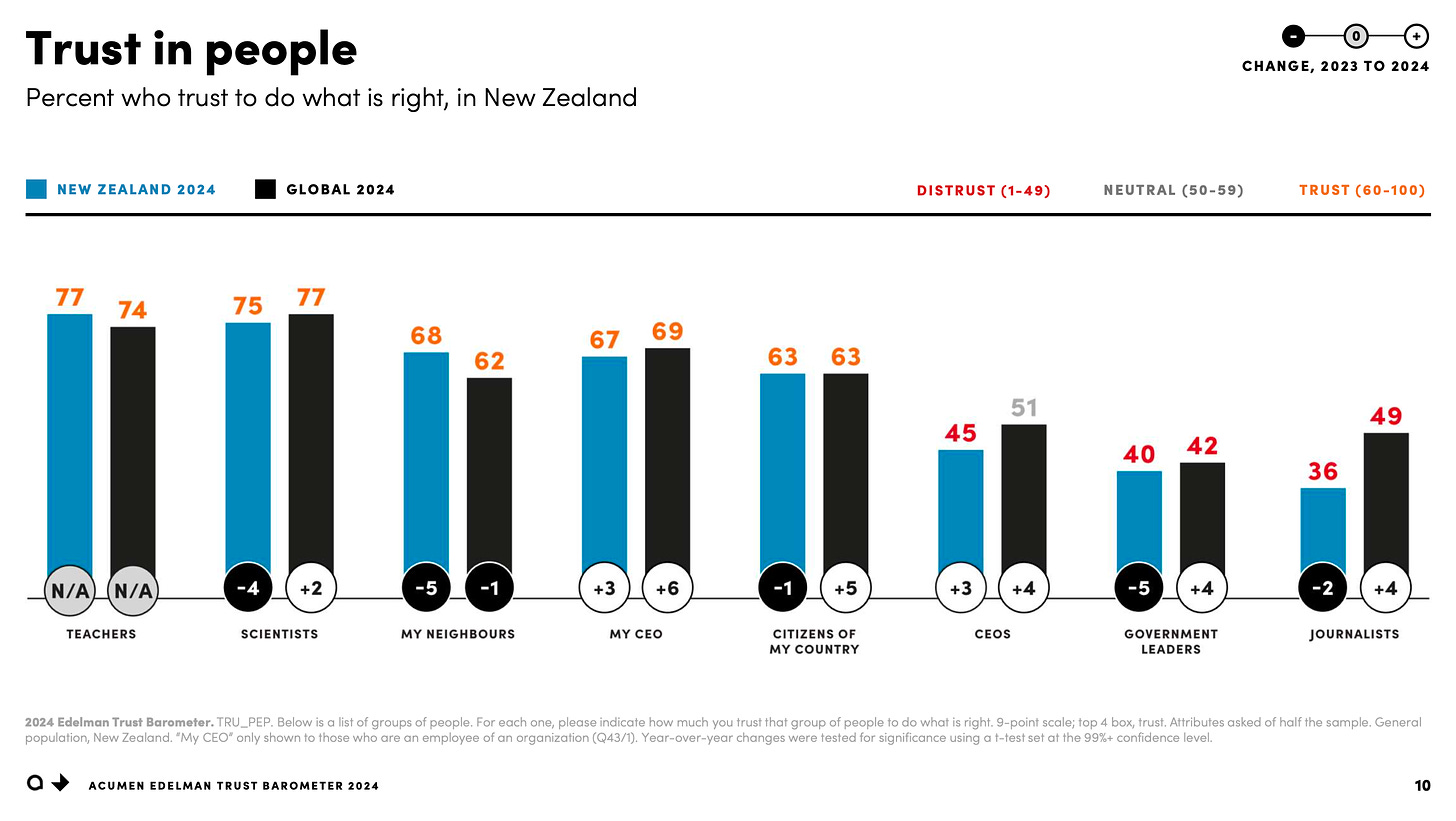
Click image to view - From the Acumen Edelman Trust Barometer 2024: Trust in people
To what extent are public leaders involved in disinformation? According to the Edelman survey, the public regards politicians, businesspeople, and journalists to be deliberately engaged in trying to mislead with “false or gross exaggerations”. Survey respondents were asked whether these three groups in New Zealand “are purposely trying to mislead people by saying things they know are false or gross exaggerations”.
Journalists and reporters scored worst – 60% deemed them guilty (up four percentage points). Government leaders were next – 51%, followed closely by Business leaders on 50%.
A Democratic Deficit
The two surveys discussed above are only the latest in a long list of indicators that something is going wrong in New Zealand democracy. Plenty of other evidence indicates that a democratic deficit has been growing in recent years.
Some of this trend surely relates to the experience of Covid and some of the governing decisions of the last government. However, it would be mistaken to focus in any sort of partisan way on trying to understand the current democratic deficit. Many of these trends were occurring before the last government and seem to be still happening under the new one.
Ultimately, these trends should provoke an awareness that this is a deep-seated problem in our political system that isn’t about individual politicians or political parties. It’s much more systemic than that. And although the above evidence is based around perception, it goes hand in hand with plenty of other concerning trends in politics at the moment, such as reduced public engagement (especially in terms of voter turnout), increased political polarisation and declining social cohesion.
More debate and discussion are required about what is producing New Zealand’s “broken politics”, and perhaps even a “broken society”.
Key Sources
Acumen (2024) Acumen Edelman Trust Barometer 2024
Jacqui Van Der Kaay (Democracy Project): Politicians need to lift their game
Victoria University of Wellington: Trust in Institutions and Democracy symposium
Stephanie Worboys (Maxim Institute): Shaky Foundations: Why our democracy needs trust
Dr Bryce Edwards is a politics lecturer at Victoria University and director of Critical Politics, a project focused on researching New Zealand politics and society. This article was first published HERE


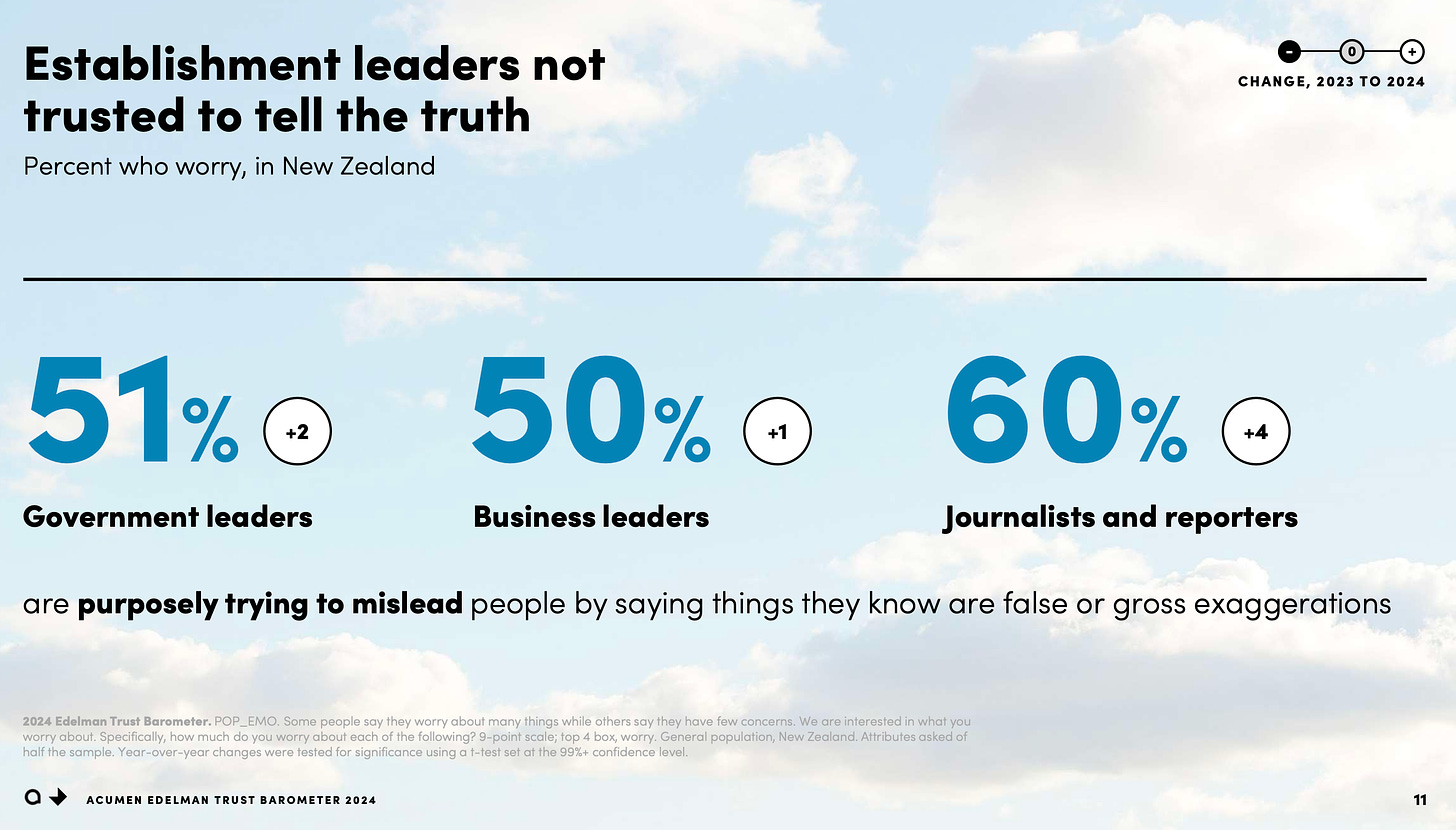
5 comments:
So Ashley Bloomfield was involved with the symposium. Given his track record in the Covid debacle and the Dept. of Health in general can someone please explain why I should be interested in his opinion on any topic under the sun.
The media have caused significant problems. They routinely report extreme views as if they are centrist and they are in opposition to mainstream New Zealand.
I suspect that the 4th Estate is now seen as the 5th Column in this country.
When you consider all the ways “we the people” are being bullied, beaten, bamboozled, targeted, tracked, repressed, robbed, impoverished, imprisoned and killed by the government, one can only conclude that you shouldn’t trust the government with your privacy, your property, your life, or your freedoms.
“We the people” should have learned early on that a government that repeatedly lies, cheats, steals, spies, kills, maims, enslaves, breaks the laws, overreaches its authority, and abuses its power at almost every turn can’t be trusted.
I would be surprised if Ken S is prepared to listen to anybody in authority. He is typical of the people who are guilty of undermining our institutions through ignorance and misinformation. With folk like that loose in the land, no wonder there is a growing mistrust of those charged with the duty of keeping us safe. The reality is that Bloomfield performed extraordinarily well in managing a very dangerous situation. Ken S should reflect on the fact that in countries like the US or Brazil or even the UK where the politicians ignored the advice of their public health officials, millions died. Fortunately our politicians knew their limitations and embraced the science. As a result Ken S and thousands of other Kiwis are still alive as evidence of Bloomfield's success.
Post a Comment
Thank you for joining the discussion. Breaking Views welcomes respectful contributions that enrich the debate. Please ensure your comments are not defamatory, derogatory or disruptive. We appreciate your cooperation.